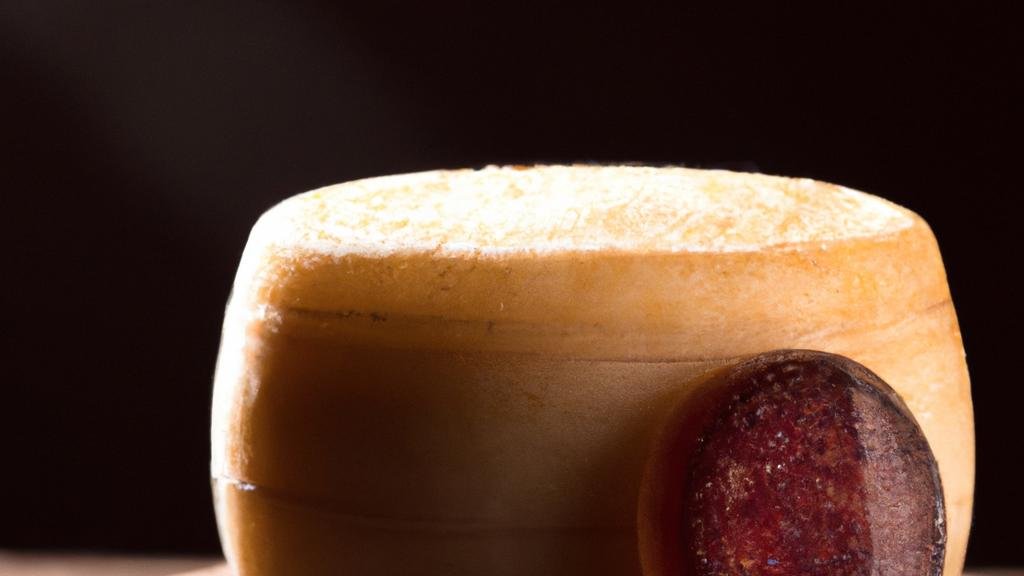
Discovering the Unique Charm of Queijo Artesanal Serrano
For the discerning cheese connoisseur, the world offers an embarrassment of riches in diverse flavors, textures, and histories. Brazil, a country more famous for its coffee and samba, quietly boasts an impressive heritage of artisan cheese-making. Among its hidden gems is Queijo Artesanal Serrano, an exquisite cheese that perfectly encapsulates the country’s rich terroir and robust gastronomical heritage.
Queijo Artesanal Serrano is a fascinating symphony of traditions and craftsmanship. Born in the Serra Gaúcha region’s high-altitude rural areas over a century ago, its production technique draws from the expertise of Italian immigrants. Made from unpasteurized cow milk, farmers adhere to traditional techniques, making each wheel of cheese a labor of love. It is typically aged between 15 to 60 days and gains complexity over time. When fully matured, it reveals a soft, buttery texture and a rich, robust flavor marked by a pleasant tanginess and a mildly spicy aftertaste.
Key highlights that distinguish Queijo Artesanal Serrano in the wide array of artisanal products are:
- Gastronomical Heritage: The cheese captures the historical culinary fusion of Brazilian and Italian artisanal traditions.
- Unique Terroir: The specific environmental conditions of the Serra Gaúcha region, including its altitude, temperature, and native pastures, greatly enhance the cheese’s unique taste and texture.
- Traditional Techniques: It is handcrafted employing century-old practices with minimal intervention, making each batch truly special and distinct.
Queijo Artesanal Serrano, like many of its artisanal cousins, shapes the story of local communities and their collective culinary journey. Such authentic gastronomical experiences offer enriching insights into traditions that continue to endure in an increasingly homogenized world, making them a treasure trove for those seeking truly unique food encounters. For the gourmet explorer, the call of the Queijo Artesanal Serrano is one that is too enchanting to resist.
Discovering Queijo Artesanal Serrano: Test Your Knowledge of Brazil's Craft Cheese Tradition!
Welcome to our quiz on Queijo Artesanal Serrano - a true gem of Brazilian artisanal cheese making. Find out how much you know about traditional methods of cheese production, the cultural significance it holds, and the rich history behind it. Are you ready to dive into the enticing world of craft cheeses? Start now!

Exploring the Grandeur of Queijo Artesanal Serrano: Composition, Attributes, and Variants
The Queijo Artesanal Serrano is a veritable masterpiece produced in the hallowed Serra da Canastra region of Brazil, renowned for its rustic flair and delectable flavor profile. Crafted using traditional methods that honour time-tested recipes and processes, Queijo Artesanal Serrano embodies a spectacular fusion of flavors derived from its primary ingredient – the raw milk of grass-fed cows.
Notably, the core constituents of this artisanal cheese involve only three elemental components—raw cow’s milk, rennet, and artisanal cheese salt. This simplicity, however, belies the surrounding complexity that shapes the creation, maturation, and final presentation of the cheese. Fermentation initiates the cheese-making process, as a result of which the raw milk is augmented with specific bacterial strains. The next step introduces rennet, an enzyme whose role it is to coagulate the milk proteins, triggering the curdling process. A thorough curdling process brings about the division of the curds and whey—thereby, forming the initial matrix of the cheese. Separation of the curds marks the beginning of its transfiguration into a denser, firmer cheese, a stage further amplified upon addition of the artisanal cheese salt. Salt enhances the flavors and hinders excessive bacteria growth. Depending on the fermentation process and maturation duration, there are different Queijo Artesanal Serrano varieties that cater to varied palates.
- Young Serrano : Aged between 21 to 60 days, it presents a mild flavor with a creamy texture. Its softer nature can be appreciated in sandwiches or grilled preparations.
- Mature Serrano : Enhanced maturation period ranging from 60 to 180 days intensifies the taste, bringing out stronger cheese flavors. Perfect for savoring solo or with a good wine.
- Extra Aged Serrano : With ageing period of over 180 days, the cheese turns harder producing crystalline salt structures and a deeply intense flavor. Perfect for grating over dishes for a gourmet touch.
The Queijo Artesanal Serrano’s unique terroir, owing to its grass-fed cows and the peculiarities of the Serra da Canastra region, imparts to this cheese a distinctive flavor that ranges from mildly lactic to a savory intensity, coupled with a beautiful lingering aftertaste. Its complexity, dictated by age and its artisanal method of production, renders it an influential representative of Brazil’s rich culinary landscape.
Discover the Rich Heritage of Queijo Artesanal Serrano
Queijo Artesanal Serrano is a traditional and highly regarded artisanal cheese that hails from the stunning mountainous region of Serra da Estrela in Portugal. Known for its exceptional quality and distinctive flavors, this cheese holds a special place in Portuguese gastronomy.
Nestled in the heart of Central Portugal, Serra da Estrela is the highest mountain range in mainland Portugal, reaching an impressive elevation of 1,993 meters (6,539 feet). The region’s unique microclimate, characterized by cold winters and hot summers, creates ideal conditions for cheese production.
Queijo Artesanal Serrano is made exclusively from the raw milk of Bordaleira sheep, a breed native to the Serra da Estrela region. These sheep graze on lush pastures filled with diverse vegetation, resulting in milk that is rich in flavor and complexity. The use of raw milk and traditional production methods contributes to the cheese’s distinct characteristics.

To make Queijo Artesanal Serrano, the raw milk is curdled using thistle flower extract, which imparts a slight floral aroma to the cheese. The curds are then carefully molded by hand, with the cheese wheels being wrapped in traditional fabric. This unique wrapping method helps to enhance the cheese’s flavor and preserve its quality.
Once the cheese wheels are formed, they go through a period of maturation, which can last from a minimum of 60 days up to several months. During this time, the cheese develops a creamy and slightly crumbly texture, with a range of flavors that can range from buttery and nutty to slightly tangy and earthy.
Queijo Artesanal Serrano is highly prized for its exceptional taste and artisanal production methods. It has earned Protected Designation of Origin (PDO) status, which ensures that it can only be produced in the designated region with specific methods and ingredients.
When enjoying Queijo Artesanal Serrano, it is best savored at room temperature to fully appreciate its complex flavors and aromas. Whether enjoyed on its own, paired with traditional Portuguese bread, or used as a versatile ingredient in various culinary creations, this cheese is sure to delight cheese connoisseurs and food enthusiasts alike.
Notable characteristics of Queijo Artesanal Serrano:
– Traditional artisanal cheese made in the Serra da Estrela region of Portugal
– Made exclusively from raw milk of Bordaleira sheep
– Curdled using thistle flower extract, giving it a slight floral aroma
– Hand-molded and wrapped in traditional fabric
– Matured for a minimum of 60 days, resulting in a creamy and slightly crumbly texture
– Flavor profile ranges from buttery and nutty to slightly tangy and earthy
– Holds Protected Designation of Origin (PDO) status
Facts and figures
- As of 2018, Queijo Artesanal Serrano has been recognized as a cultural heritage of Brazil.
- This cheese is traditionally produced in the South of Brazil, particularly in the regions of Campos de Cima da Serra.
- Crafting Queijo Artesanal Serrano is a tradition passed down through generations of family farmers.
- This cheese is characterized by its natural rind and yellow coloration, inherent from the unpasteurized cow's milk used in its production.
- Queijo Artesanal Serrano is usually aged for a period of 25 to 40 days under specific conditions to achieve its characteristic flavor.
- Reportedly, the cheese has a slightly salty, buttery flavor which augments with ageing.
- Queijo Artesanal Serrano pairs excellently with wine, making it a staple in Brazilian wine and cheese feasts.
The Art of Using Queijo Artesanal Serrano in Culinary Creations
Traditional cheese, carefully handcrafted and matured, brings a wealth of flavors to the culinary experience. One such cheese, rich in tradition and taste, is the Queijo Artesanal Serrano, an artisanal cheese from the mountainous regions of Southern Brazil. Known for its firm yet creamy texture and complex saltiness, this cheese carries a taste imprint of the cool high-altitude pastures where it originates. Once you have tasted this incredible cheese, incorporating it into your food preparations becomes a culinary journey.
For Queijo Artesanal Serrano, one classic combination is with fruits and preserves. Its unique flavor profile complements the sweetness of fruits, as well as the richness of dark honey and thick preserves. A simple yet delightful dish to try is a cheese platter highlighting Queijo Artesanal Serrano.
Queijo Artesanal Serrano with Honeyed Fruits:
- 150g Queijo Artesanal Serrano, thickly sliced.
- Assorted fresh fruits like pears, grapes, and apples, sliced.
- 50g of dark honey.
- 30g of thick fruit preserve.
- Fresh baguette slices or artisanal crackers.
Arrange the cheese, fruits, preserves, and bread or crackers aesthetically on a platter. Drizzle honey over the cheese and fruits, adding an indulgent sweetness that enhances the complex flavors of the Queijo Artesanal Serrano. This dish is perfect for a leisurely afternoon snack or as a finale to a delightful meal.
Queijo Artesanal Serrano also works beautifully in warm dishes. Its creamy texture when melted lends itself perfectly to pasta dishes, creating a creamy, indulgent blanket for perfectly al dente pasta. For a comforting dinner, try this simple yet flavorful pasta recipe.
Queijo Artesanal Serrano Pasta:
- 200g spaghetti.
- 200g Queijo Artesanal Serrano, grated or crumbled.
- 50g of butter.
- 2 cloves garlic, minced.
- Salt and freshly ground pepper to taste.
Cook the spaghetti according to package instructions. In a separate pan, melt the butter and sauté the garlic until it turns golden. Blend in the Queijo Artesanal Serrano until it forms a smooth sauce. Mix in the cooked pasta and season with salt and pepper. A final topping of extra Queijo Artesanal Serrano to garnish your pasta creates a creamy, tangy finish that’s absolutely irresistible.
These recipes are versatile and simple, letting the Queijo Artesanal Serrano be the star that it is. Use these as a starting point and discover even more creative ways to highlight this artisanal cheese in your dishes.
Revel in the Gourmet Harmony of Queijo Artesanal Serrano, Wine, and Gastronomic Delicacies
The gastronomic world’s best rewards often surface in the harmonious pairing of flavours. One such instance can be found in the sophisticated meeting of Queijo Artesanal Serrano, a well-respected artisanal cheese hailing from the highlands of Southern Brazil, with select wines and dishes. Made from raw cow’s milk and aged for 60 days, this semi-hard cheese boasts unique flavours that are slightly salty, buttery, and naturally tangy. Owing to its indulgent creaminess and subtle piquant finish, finding its perfect wine tandem and mouthwatering meal companion promises a heightened epicurean experience.
A complex, but balanced cheese like Queijo Artesanal Serrano calls for wines that can match its richness without overshadowing its nuanced flavour profile. For white wine lovers, an oaky Chardonnay is a commendable companion, its high acidity and undertones of apple and pear blending well with Serrano’s creaminess and slight tang. When it comes to reds, a light-bodied Pinot Noir with its delicate, fruity characteristics, matches remarkably well. And should one opt to explore the world of dessert wines, a full-bodied, sweet-spicy Port provides a gentler contrast, enhancing the innate creaminess of the Serrano.
Queijo Artesanal Serrano’s culinary versatility also allows it to shine in a broad range of dishes. Some exemplary combinations include:
- Brazilian Pão de Queijo: In this traditional cheese bread, replace half the standard cheese with Serrano for an indulgent twist.
- Artisanal Grilled Cheese Sandwich: This elegant reinterpretation of the classic sandwich highlights the butteriness of Serrano, especially when paired with whole grain mustard and fresh arugula.
- Arugula and Pear Salad: Spicy arugula, sweet pear, and rich Queijo Artesanal Serrano make for a crunchy, refreshing dish with an enticing contrast of flavours.
In conclusion, the combination of Queijo Artesanal Serrano with the right wine and dish can transport you to an enchanting narrative of tastes and traditions. Explore and experiment further to discover the distinctive character of this esteemed Brazilian cheese, and enjoy the wonderful culinary journey it promises.
Discover These Delicious Cheeses That Resemble Queijo Artesanal Serrano
Queijo Artesanal Serrano is a traditional Portuguese cheese made from raw sheep’s milk. Known for its rich, tangy flavor and distinctive aroma, this cheese is beloved by cheese enthusiasts around the world. If you’re a fan of Queijo Artesanal Serrano and are looking to explore similar cheeses, here are a few options that you won’t want to miss:
1. Manchego: Hailing from Spain, Manchego is a sheep’s milk cheese that shares some similarities with Queijo Artesanal Serrano. It has a firm and crumbly texture, along with a nutty and slightly salty flavor. Aged Manchego has a more intense taste that develops a sharpness reminiscent of Queijo Artesanal Serrano.
2. Pecorino Romano: Originating from Italy, Pecorino Romano is a hard cheese made from sheep’s milk. It is salty and tangy with a slightly granular texture. While the flavor profile is different from Queijo Artesanal Serrano, its robust taste makes it an excellent option for those seeking a strong cheese.
3. Roncal: Hailing from the Basque region of Spain, Roncal is a raw sheep’s milk cheese that is firm and smooth in texture. It has a balanced, nutty flavor with hints of sweetness and herbs. Its complexity and distinctive taste make it a worthy alternative to Queijo Artesanal Serrano.
4. Fiore Sardo: This Italian cheese hailing from Sardinia is made from unpasteurized sheep’s milk. It has a firm texture and a smoky, nutty flavor that sets it apart. While not identical to Queijo Artesanal Serrano, Fiore Sardo’s unique characteristics are sure to impress cheese connoisseurs.
Regardless of which cheese you choose, exploring these similar options will allow you to experience the distinct flavors and textures that make Queijo Artesanal Serrano so special. Whether you savor it on its own, pair it with wine, or use it as an ingredient in your favorite recipes, these cheeses are sure to delight your taste buds. Enjoy the journey of discovering these delectable alternatives!

